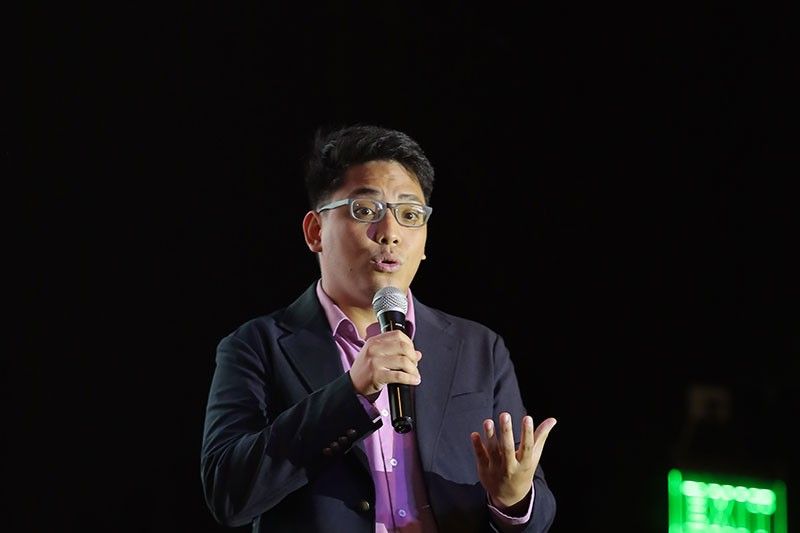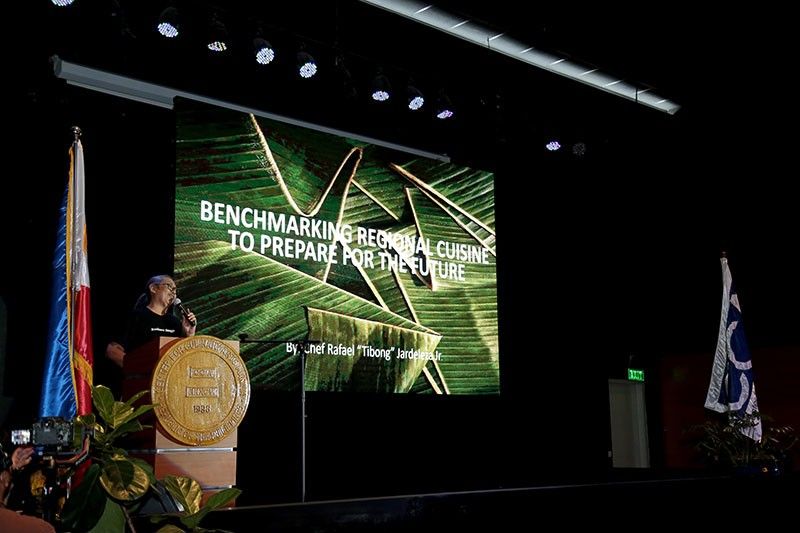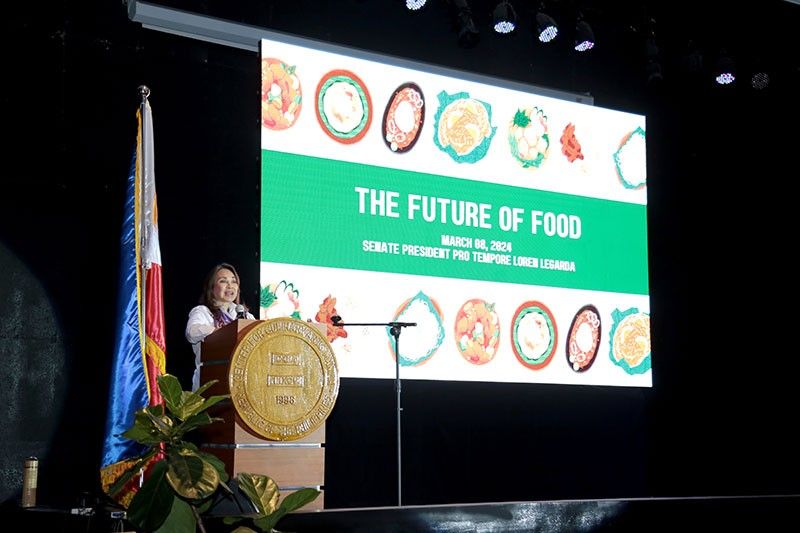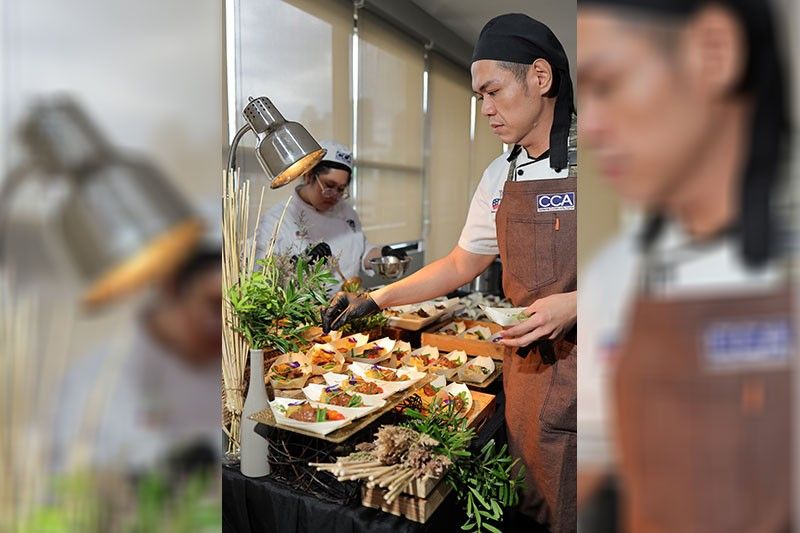The future of food

I met Ella, Singapore's first robotic barista, at Changi International Airport. Ella serves various drinks non-stop, from a classic latte to a Pandan Tea latte. It's a sign that the landscape of food and beverage is moving at a fast pace. It was a glimpse into the future of our culinary world.
On March 8, 2024, I organized "The Future of Food 2024" conference in partnership with CCA Manila and Courage Asia at the Auditorium of The University of the Philippines, Bonifacio Global City.

What’s next on our plates?
We asked this critical question of our invited speakers: Senate President Pro Tempore Loren Legarda, Paco Magsaysay (Carmen's Best), John Sherwin Felix (Lokalpedia), Carlomagno Aguilar (FarmYields Inc), Elbert Cuenca (Elbert's Steak Room, Metronome, and Elbert's Collective), chef Louise Mabulo (The Cacao Project), Ana Lorenzana de Ocampo (the Wildflour Group), David Sison (Mama Lou's Group), chef Philip John Golding (CCA Manila), Angelo Basuan (PwC Philippines), chef Rafael "Tibong" Jardeleza Jr. (Kusinero Ilonggo), Rhodel C. Esteban (MacroAsia Corporation), Marco and Kate Anzani (Anzani International Group), and Shayne Madamba (HAVAS Ortega).
The conference highlighted key trends shaping the future of food. Madamba pointed out the first realization: "Modern foodies are discerning and thoughtful when they select certain items." This emphasis on choice and quality reflects a growing trend among consumers who demand the best, not just in taste but also in how their food is prepared and presented. So, what should people in the food industry do to stay ahead?

1. Embrace technology in the kitchen and restaurants, or your competitors will.
This is why kitchens and restaurants must step up and embrace technology. David Sison of Mama Lou's, who uses a lot of technology, shared his team's practical applications in making their operations more efficient. One example is a communication tool called Lark, where "different departments are now collaborating, reporting in one application. It's like being in all the restaurants at the same time."
Chef Philip John Golding of CCA Manila also discussed the advancements in kitchen equipment, saying, "The kitchen is about to get smarter with equipment that is also about cutting cooking time and prepping ingredients without someone looking over.” This leap towards smarter kitchens powered by smartphones suggests a future where technology not only aids chefs but also enhances culinary creativity.
With all the talk on AI, especially ChatGPT, Angelo Basuan of PwC Philippines underlined the significance of staying ahead with technology, stating, "AI won't take our market share, but our competitors using AI could." His advice: "Use GenAI. Experiment with it. And be ahead of the curve." He underscores the necessity for the culinary industry to embrace generative AI for innovation in recipes, content creation, and flavor mapping.

2. Practice sustainability. It's good for business and the earth.
There was a lot of talk on sustainability; each person shared good practices for the earth and business. Paco Magsaysay, founder of Carmen's Best, shared how he came up with the idea of making ice cream: "My father asked me to help with the dairy farm. They intended to sell the milk as fresh milk, meaning pasteurizing and homogenizing the milk as fresh milk. So it only had a seven- to 10-day shelf life, and a lot of the milk was being thrown away because it was not being sold in time. And that's when I came up with the idea of coming up with a product that would actually extend its shelf life and also add a little value."
Kate and Marco Anzani emphasized the significance of sustainability, noting, "Sustainability is guided by a framework. This means doing things in a way that can be checked and measured, proving it's possible to take care of the environment while running a successful business." She detailed the rigorous journey of applying for ISO certification for their business, underscoring that achieving ISO certification is crucial as it validates a business's commitment to sustainability and operational excellence on a global standard.
Senator Loren Legarda shared one of her many efforts: "I introduced the Senate bill on my fourth term, the Zero Food Waste Act." One example is a tradition she's been doing for a couple of years now: "In celebration of my birthday, I've been initiating on a small scale Bayong-All-You-Can for our senate staff and employees, where they can fill their Philippine-made bayongs, of course, with vegetables rescued from distressed farmers as near as Laguna and as far as the Cordillera, directly contributing to reducing food waste while providing support to farmers who would otherwise lose income." She urged everyone to combat food wastage in their own way.
Chefs Louise Mabulo and Rafael Jardeleza (chef Tibong) stressed eating local foods and keeping cooking traditions alive. Mabulo said, "By eating local, you're preventing us from experiencing food insecurity." Chef Tibong, an advocate of Ilonggo heritage cuisine, talked about Tabu-an, a cooking contest that uses only local ingredients and traditional cooking equipment. No electric kitchen equipment can be used. "They can only use charcoal and wood to prepare food for 300 people," he said.
John Sherwin Felix, the founder of Lokalpedia, an online platform for local and lesser-known regional ingredients, pointed out that "documenting these ingredients is crucial for conservation and sustainable use."
Together, these stories from the conference show that being sustainable means making smart choices, from how we grow food to how we eat it, all while taking care of our planet.
3. Invest in a global level of training and multi-sensory experiences.
The third big idea was about learning from around the world and making eating out an experience that hits all your senses. This move makes food more than just food; it makes it an experience that wins people over.
Ana De Ocampo, CEO of The Wildflour Group, shared, "We invest painstakingly in inviting our restaurants with the best resources and practices that the world has to offer. Our chefs have academic working experience from great restaurants in the US and other countries." They bring knowledge and training from abroad to improve their food and service.
Elbert Cuenca said, "We need to give people a reason to eat out. Filipinos generally do not go out to eat. If we can elevate our guest experience, maybe we can give them a reason to go out." He views restaurants as more than just places to eat: "Restaurants are no different from cinemas and theaters. We are actually entertainers, and we have an audience."
4. Create better synergy between farmers, chefs, and landowners.
Carlo Aguilar from FarmYields Inc. pointed out, "Did you know that there are a lot of landowners na hindi nila alam anong gagawin nila sa lupa nila, nakatengga lang. You can find a lot of farmers who have the skill to grow food, pero wala silang mataniman. And we can find a lot of restaurant owners and chefs who want vegetables and ingredients na minsan hindi nila mahanap. We connected all of these three."
He also shared examples of farm-to-table projects in Batangas and Palawan, where chefs can pick fresh vegetables from their farms. This cooperation, he says, benefits everyone involved. He says it's a "win-win situation" and that "the future of food is farm-to-table," emphasizing directly linking farms with dining tables for fresher and more sustainable food.
5. Give people what they crave, but learn to scale it.
Rhodel Esteban from MacroAsia Corporation shared his company's adaptation journey amid the COVID-19 pandemic. He humorously transitioned from being an aeronautical engineer to, "Now I'm selling peanuts," highlighting his shift to airline catering.
When the pandemic grounded flights and closed airports, Esteban faced a gloomy reality, questioning, "Walang lumipad, walang pasahero, sarado ang airport. Anong gagawin namin?"
MacroAsia Corporation tapped into the digital marketplace to meet consumer demand, among many other innovative responses. They leveraged the popularity of their arroz caldo, a favorite in PAL's Business Class lounge, by selling it online.
They distributed this using the Grab app, which earned them significant daily revenue. These strategic moves highlight how MacroAsia creatively scaled products through digital platforms, ensuring its survival and continued connection with its customer base during challenging times.
Seeing Ella, the robotic barista in Singapore, and running the "Future of Food 2024" conference opened my eyes. Change is important because it’s all about improving our food experiences, which reminds me of something Hannah Fry wrote in Hello World: How To Be Human in The Age of The Machine: "The only thing we care about is the human experience." The big task ahead is keeping our human touch amid all these technological changes.




















